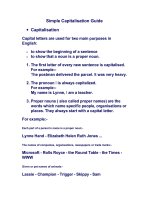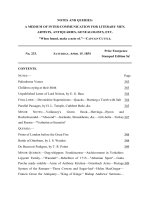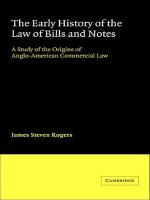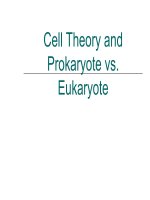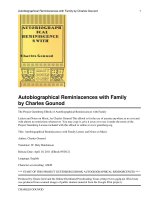- Trang chủ >>
- Đề thi >>
- THPT Quốc Gia
s2004 notes
Bạn đang xem bản rút gọn của tài liệu. Xem và tải ngay bản đầy đủ của tài liệu tại đây (216.07 KB, 6 trang )
STUDY NOTES
EPISODE 4: CLOUDS
PARAGRAPH WRITING
STUDY TIPS
Formal academic writing is the kind of
writing required for the IELTS academic
test, whether it is the task 2 essay or, the
task 1 report, process description or object
description. Irrespective of the task, all
pieces of academic writing require you to
organise your writing into cohesive and
coherent paragraphs. The paragraph itself,
being the basic underlying unit for your
writing, needs to be cohesive and
coherent. It should also be structured and
contain a topic sentence and, supporting
and developing sentences.
When writing remember the whole
paragraph needs to focus on the
main idea stated in your topic
sentence. The remaining
sentences in the paragraph
support and develop the idea with
examples, explanations,
clarifications, illustrations or other
points. The supporting and
developing sentences need to be
logically ordered. Together these
would form a well-written
paragraph.
What is a paragraph?
A paragraph is a group of related sentences, which develop or discuss a topic or
main idea. Structurally, a paragraph consists of three parts, including a topic
sentence, supporting and developing sentences. In addition, a good paragraph is
coherent, which means that the sentences are logically ordered and connected.
Consider the following sample paragraph.
Environmental pollution is having a devastating effect on
mankind. Firstly, water pollution reduces valuable supplies of
fresh, clean water needed for daily consumption. Most of the
pollutants, which enter the water come from industry, sewage
systems, and agriculture. These include chemicals and harmful
wastes from animals and plants. Another devastating effect is
brought about by air pollution, which turns fresh, clean air into
smoggy, unpleasant smelling air. The result of air pollutants is
the harm it has on human health. For example, the gases, which
are released into the atmosphere can cause such diseases as
emphysema and cancer.
Page 1 of 6
Structural parts of a paragraph
Topic Sentence (TS)
The topic sentence provides the main idea or subject of the paragraph, and further
identifies a controlling idea restricting the topic area of discussion. It is the first
sentence in the paragraph. Look at the topic sentence in the sample paragraph:
Environmental pollution is having a devastating effect on mankind.
topic
controlling idea
The topic of the paragraph is environmental pollution, but this topic is further limited
to a discussion of the devastating effects on mankind.
Supporting Sentences (SS)
Supporting sentences (as the word ‘support’ indicates) support the topic by providing
points, which develop the idea with an explanation, illustration, reason etc. The two
supporting sentences, which explain the topic sentence about environmental
pollution are:
•
Firstly, water pollution reduces valuable supplies of fresh, clean water needed
for daily consumption.
•
Another devastating effect is brought about by air pollution, which turns fresh,
clean air into smoggy, unpleasant smelling air.
Developing Sentences (DS)
Developing sentences further develop the points in the supporting sentences by
providing more information or an example, a reason, a clarification etc. For example,
the point about water pollution is further developed in the following two developing
sentences:
•
Most of the pollutants, which enter the water come from industry, sewage
systems, and agriculture.
•
These include chemicals and harmful wastes from animals and plants.
The point about air pollution is further developed in the following sentences:
•
The result of air pollutants is the harm it has on human health.
•
For example, the gases, which are released into the atmosphere can cause
such diseases as emphysema and cancer.
Page 2 of 6
Thus the paragraph on environmental pollution has the following structure.
TS
Environmental pollution is having a devastating effect on
mankind. SS1
Firstly, water pollution reduces valuable supplies of
fresh, clean water needed for daily consumption. DS1.1
Most of
the pollutants, which enter the water come from industry, sewage
systems, and agriculture. DS1.2
These include chemicals and
harmful wastes from animals and plants. SS2
Another devastating
effect is brought about by air pollution, which turns fresh, clean air
into smoggy, unpleasant smelling air. DS2.1
The result of air
pollutants is the harm it has on human health. DS2.2
For example,
the gases, which are released into the atmosphere can cause such
diseases as emphysema and cancer.
A paragraph can have a variety of different structures. Other good paragraph
structures include:
TS
SS1 + DS1.1
SS2 + DS2.1
TS
SS1 + DS1.1
SS2 + DS2.1
SS3 + DS3.1
TS
SS1 + DS1.1 + DS1.2
SS2 + DS2.1 + DS2.2
TS
SS1 + DS1.1 + DS1.2
Paragraph Length
The length of a paragraph will depend on how clearly the main idea or
subject is developed. A paragraph can be anywhere from 3-4 sentences
or as long as 9 or 10 sentences.
Paragraph Cohesion and Coherence
Two other important features of a good paragraph are cohesion and coherence.
Page 3 of 6
Cohesion
Cohesion is the agreement between the different parts of a sentence. This may
include: subject-verb agreement, and the use of correct articles and pronouns to
track participants in the paragraph etc. Cohesion also means that all the supporting
and developing sentences must relate directly to the main point stated in the topic
sentence. Discussing recycling in the paragraph on environmental pollution, for
example, would be irrelevant to the topic and, therefore, disrupt the unity of the
paragraph.
Coherence
A paragraph is coherent when the reader can easily understand and follow the
information/message conveyed in the text. Coherence can be achieved in several
different ways:
•
•
arranging ideas logically
using transition signals
Arranging ideas logically
Depending on the topic and purpose of the paragraph, ideas and sentences can be
organised in different ways, for example, chronologically, spatially or according to
some logical order of ideas.
When a paragraph is organised chronologically, the sentences would be connected
using time expressions such as: ‘after that’, ‘then’, ‘as soon as’, ‘while’, ‘before’, ‘in
2005’ and others.
When a paragraph is organised spatially, the sentences would be connected using
spatial order words such as: ‘to the left’, ‘on the right’, ‘above’, ‘below’, ‘behind’ ‘at the
centre’, ‘between’ and others.
When a paragraph is organised according to some logical order of ideas, sentences
discussing a specific idea are grouped together. In the sample paragraph on
environmental pollution, water pollution is presented as one of the devastating
effects. The group of sentences discussing the specific idea of water pollution begins
with the transition word ‘first’. This is further supported by two developing sentences,
which in turn directly relate back to the main idea of environmental pollution. The
order of ideas grouped together can be illustrated as follows:
environmental pollution
devastating effect on mankind
water pollution
pollutants from industry, sewage & agriculture
chemicals & harmful waste
first group of related sentences
Firstly, water pollution reduces valuable supplies of fresh, clean
water needed for daily consumption. Most of the pollutants,
which enter the water come from industry, sewage systems, and
agriculture. These include chemicals and harmful wastes from
animals and plants.
Page 4 of 6
The second devastating effect, which is discussed is air pollution. The group of
sentences relating to this specific idea is introduced using the transition word
‘another’. This is followed by two developing sentences, which directly relate back to
the main idea of environmental pollution. The relationship of sentences in this group
is illustrated as follows:
environmental pollution
devastating effect on mankind
air pollution
harm of pollutants on human health
gases released cause disease
second group of related sentences
Another devastating effect is brought about by air pollution,
which turns fresh, clean air into smoggy, unpleasant smelling air.
The result of air pollutants is the harm it has on human health. For
example, the gases, which are released into the atmosphere can
cause such diseases as emphysema and cancer.
Using transition signals
Transition signals connect one idea to the next, guiding the reader through the
paragraph. To indicate an opposite idea is being presented in your paragraph the
transition signal ‘however’ is used, for example. If another idea is being presented,
‘furthermore’ can be used to introduce it.
There are a variety of different transition signals. Here is a list of some of the more
common sentence and clause connectors which function as transition signals.
Transition Signals
Clause Connectors
Coordinating
Conjunctions
giving more
in addition,
and
furthermore,
information
moreover, also
introducing a
in contrast, however, but, yet
on the other hand,
contrasting idea
nevertheless
describing a
as a result,
so
result/consequence consequently, as a
consequence,
accordingly, therefore
giving an example
for example, for
instance
listing ideas
first, firstly, second,
secondly, finally, last,
last of all
Sentence
Connectors
Subordinating
Conjunctions
although,
though,
whereas, while
Notice the transition signals used in the paragraph on environmental pollution.
Page 5 of 6
Environmental pollution is having a devastating effect on
mankind. Firstly, water pollution reduces valuable supplies of
fresh, clean water needed for daily consumption. Most of the
pollutants, which enter the water come from industry, sewage
systems, and agriculture. These include chemicals and harmful
wastes from animals and plants. Another devastating effect is
brought about by air pollution, which turns fresh, clean air into
smoggy, unpleasant smelling air. The result of air pollutants is
the harm it has on human health. For example, the gases,
which are released into the atmosphere can cause such
diseases as emphysema and cancer.
Page 6 of 6

